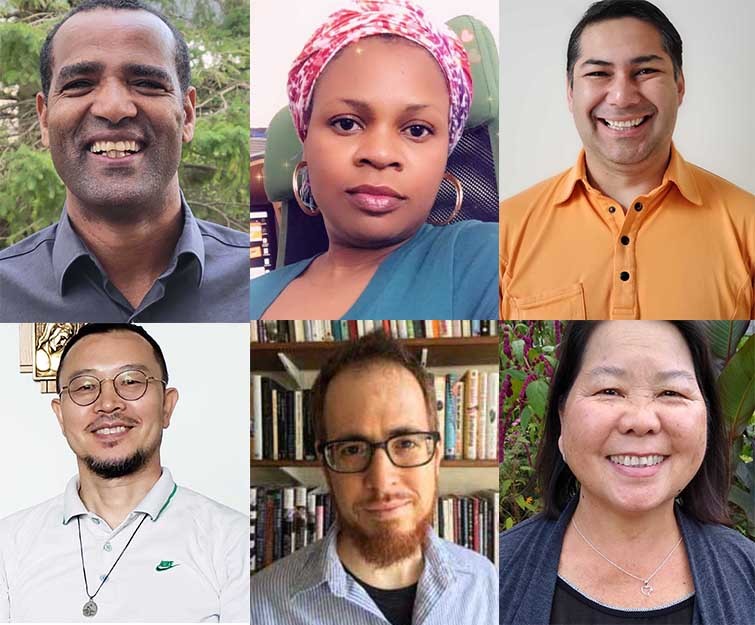

Members of the ICSC (clockwise from top left): Fanosie Legesse, Jolie Mamissa, José-Luis Moraga, Joon Park, Josh Wallace, Ly Vang.
The East Gallatin River outside of Belgrade, Montana, a year after a head-on collision. A church in Democratic Republic of Congo. A church in Chile. A Baptist church in Korea after a three-year army term. A bathtub in Ethiopia. A Baptist church in Kitchener, Ont., after five years in a refugee camp in Thailand.
Stories of baptism from members of Mennonite Church Canada’s Intercultural Church Steering Committee (ICSC) are diverse. Several made the decision to be baptized during or after a time of crisis. Others committed themselves as teenagers, as many who grew up in Mennonite Church Canada congregations did.
Each of these members, who actively participate in Mennonite Church congregations across Canada, have committed to providing leadership to the nationwide and regional churches as Mennonite Church Canada seeks to become an intercultural church.
The group is taking the lead from Safwat Marzouk’s influential Becoming an Intercultural Church (2019, 1517 Media), which describes intercultural church as one that “fosters just diversity, integrates different cultural articulations of faith and worship, and embodies an alternative to the politics of assimilation and segregation.”
“The first step is to recognize that it is a long process,” says Fanosie Legesse, who is a member of Zion Mennonite Church in Elmira, Ont., and intercultural mission minister for Mennonite Church Eastern Canada. Then, he says, building awareness is key: “Our congregations…need to be aware of the fact that Mennonite Church Canada is becoming a home for many nations, languages and people of different socio-economic backgrounds.”
'Our congregations…need to be aware of the fact that Mennonite Church Canada is becoming a home for many nations, languages and people of different socio-economic backgrounds.'
Since the group began meeting in February 2021, members have taken the time to learn about one another and share their own experiences and reasons for why intercultural church is significant.
Joon Park, member of Emmanuel Mennonite Church in Abbotsford, B.C., hopes to see BIPOC voices heard more in church policy and leadership decisions. This will “help us have ownership of Mennonite Church Canada,” he says. He hopes the committee will be “a transforming seed that…is used to bring change to the current stagnant, monolithic and institutionalized church structure.”
José-Luis Moraga, pastor of discipleship at Springfield Heights Mennonite Church in Winnipeg, Man., says that, along with representation, creating opportunities for sharing stories of how God is at work across “the diverse Mennonite family” is important. Fanosie agrees and stresses that opportunities for one-on-one conversations between people of different cultural backgrounds are vital.
Jolie Mamissa, member of Calgary First Mennonite Church, says it isn’t one answer fits all. “A church is a body of Christ made of people with different values and cultures. So we need to consider different aspects before answering this question (of what can we do to become intercultural church?). But since our Christian values are above all, God will guide us through this process so we can come up with an answer.”
"A church is a body of Christ made of people with different values and cultures. So we need to consider different aspects before answering this question (of what can we do to become intercultural church?).'
Each committee member will be a liaison and resource person for their regional church. The ICSC committee also has plans to gather the leadership of Mennonite Church Canada and the regional churches together in 2022 to discuss policy changes and next steps.
“Becoming an intercultural church means examining the ways we function as an organization as well as how we worship and serve together,” says Doug Klassen, executive minister for Mennonite Church Canada. We must find ways to cultivate mutually transforming relationships and practices.”
Information about the ICSC committee and its work will continue to be updated at mennonitechurch.ca/intercultural-church.
-30-
Media contact
1-866-888-6785 ext. 115